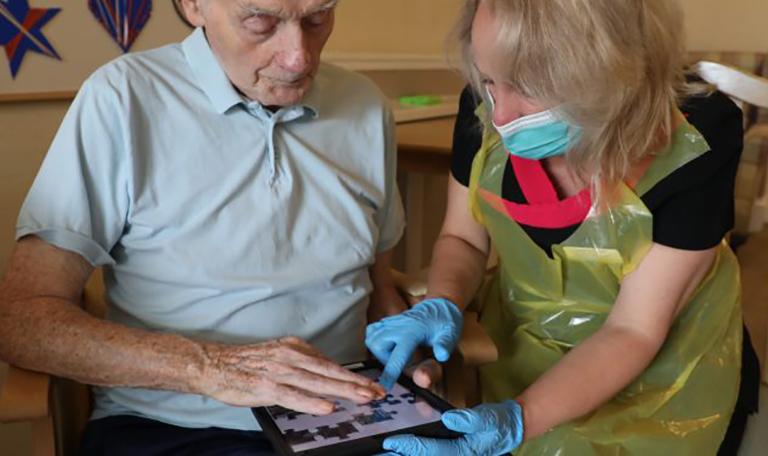NHSX iPads for care homes project: how our response to the pandemic has shaped our strategy

In December 2020, NHSX (now part of the NHS Transformation Directorate) provided 11,000 iPads to residential care homes, to help people stay connected to their loved ones throughout COVID-19 visiting restrictions. Following an independent evaluation of the project the team reflects on its successes and challenges. And how this first-of-its-kind national technology rollout into social care has influenced our longer-term plans to drive digital transformation in the sector.
COVID-19 had a huge impact on our lives, and care providers supported some of our country’s most vulnerable people through this time. Lockdowns and infection control measures meant that many people drawing on care no longer had face to face contact with their friends, families and loved ones.
People who work in care were – and still are – under a huge amount of pressure. Their workloads increased; they rolled out testing and vaccinations to protect the people in their care, doing all this with reduced staffing numbers as people in the workforce caught covid themselves or faced burn out.
We knew that many care homes had limited access to technology that could help people stay connected to their family, friends and communities over winter and Christmas. We wanted to give care homes fast – reliable – access to technology that would let people stay in touch and allow essential remote consultations with healthcare professionals.
Within NHSX, a team was mobilised to co-ordinate a fast-paced, national rollout of 11,000 iPads directly into care homes. These devices were preloaded with relevant apps, support links, and a 4G sim card to ensure access to the internet wouldn’t be a barrier. The aim was to deliver a quick solution to help people living in care homes feel less isolated and to support care staff through the pandemic.
The evaluation showed that the iPads enabled at least 30,000 video calls per month between people drawing on care and their loved ones, and that without this project, it’s likely that those calls wouldn’t have happened.
We were excited to get it for video calls to family… it was all phone calls before [the pandemic]
Manager, Small home for people with complex care needs, East Midlands
Some care homes who received iPads used their creativity to find that the tablets could help them in all sorts of ways beyond their original intent.
We use the iPad to get prescriptions for the service users, it’s much faster we can get it in 25 minutes rather than 24 hours. The service users like it too as they can have conversations with their psychologist [for example] in the privacy of their own rooms.
Manager, Small home for people with complex care needs, Birmingham
But the project wasn’t without its challenges. The evaluation also found that some care homes struggled to engage with a new piece of technology given the huge workload pressures during the pandemic. And suggested that the project could have done more to give care providers engaging support materials. There was – partially down to time constraints – an overreliance on formal how-to documents for support, where more videos, peer-to-peer support, and user-led stories could have been more effective.
[The iPads were] brilliant, but it was too much in one go. With everything going on I felt pressured into trying to update our tech capacity too quickly.
Clinical lead, mid-sized home for people at end of life, South-East
There were many lessons learned through the iPads project, including how we can best engage with the social care sector and work through local and national partner organisations. These have helped to shape our ambitious Digitising Social Care programme that is now well underway.
The People at the Heart of Care white paper for adult social care reform, published in December 2021, committed to investing £150m in the digitisation of adult social care. And we are working with care providers and integrated care systems to support the adoption of digital social care records and care technologies that support quality and safety of care, improve people’s quality of life and support people to remain independent at home for longer.
And this is all just the beginning; there’s a long road to digitisation in social care, and towards integration with NHS services. But learning from this, and all the projects we deliver, we will strive to put people at the centre of that journey.
To find out how technology is used in care homes watch this video.